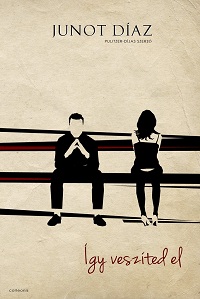Junot Díaz: This Is How You Lose Her
 I’m a sucker for good titles. It’s often enough for me to see the title of a book to fall immediately in love with it, without knowing anything else about it. This was also the case with Junot Díaz’s short story collection – the suggestive title, and the wonderfully subdued, slightly melancholic cover of its Hungarian edition (pictured above) amazed me at first sight, and I wanted the read the book at once. Which I did, and I loved it.
I’m a sucker for good titles. It’s often enough for me to see the title of a book to fall immediately in love with it, without knowing anything else about it. This was also the case with Junot Díaz’s short story collection – the suggestive title, and the wonderfully subdued, slightly melancholic cover of its Hungarian edition (pictured above) amazed me at first sight, and I wanted the read the book at once. Which I did, and I loved it.
This Is How You Lose Her is a loose-knit novel made up of interconnected short stories. The stories are centered around a typical (?) Dominican immigrant family who live in the US. The main character (and also the narrator of all but one of the stories, speaking either in the first or the second person singular) is Yunior, the younger son of the family, and the stories mostly deal with his emotional development and his love affairs: the first one, „Sun, Moon, Stars” is about the end of his relationship with one of his girlfriends whom he cheated on; „Alma” tells the story of a different ending of another relationship; while „Lola” is about the period when Yunior, then a high-school student, got entangled in an affair with a woman several years his senior. There are also a couple of stories which deal with the romantic and sexual goings-on of other people, for instance, the main characters of „Nilda” are Yunior’s brother, Rafa and Rafa’s girlfriend – but even in stories like this we mostly learn about the way the narrator experiences the relationship.
I didn’t do an extensive background check before reading this book, but I realize that several of these stories appeared earlier in the New Yorker or in other magazines as self-standing short stories. And I’m pretty much convinced that these stories can indeed be read separately – they are not that interconnected. However, it’s best to read them in book form – then the self-contained melancholy of the stories adds up into a great, complex melancholy; a melancholy full of inexplicable cravings and desires. The sad-angry mood of these stories is, however, not so heavy as to make the reader completely melancholic, because this book isn’t only about losing all kinds of people and things (loved ones, girlfriends, brothers, spouses; homes and countries) – it’s also about everything that comes before and after the loss: the wild or tender or passionate love-makings and love games (either with the „official” partner or with someone else); the desire and fever which precedes the sexual fulfillment; or the difficulties of growing up and starting over again after a painful break-up – so there’s a lot of vivacity and sexual tension and excitement in this book besides the unmistakable and all-permeating melancholy.
And although this isn’t the most prominent feature for me, in the background of all these gloomy break-up stories there lurk the tensions and difficulties of being an immigrant in the US. We can read about women left behind in the Dominican Republic, awaiting the time when they can join their husbands who are working (and womanizing) in America; there’s a mention of a previously „good” neighborhood from which every white family moves away after immigrant families move in; and we can also read about independent immigrant women who feel a never-ending longing for their home countries, despite their seemingly luxurious new life in America.
Junot Díaz himself is also Dominican-American, and you don’t have to dig deep into his biography to be able the find the autobiographical elements in this novel, but anyway – I feel that you can dispense with the immigrant experience and the autobiographic quality since this novel isn’t good and interesting because of these – these stories are simply good as they are: they are emotional, sensual, passionate, sad, and very powerful.





